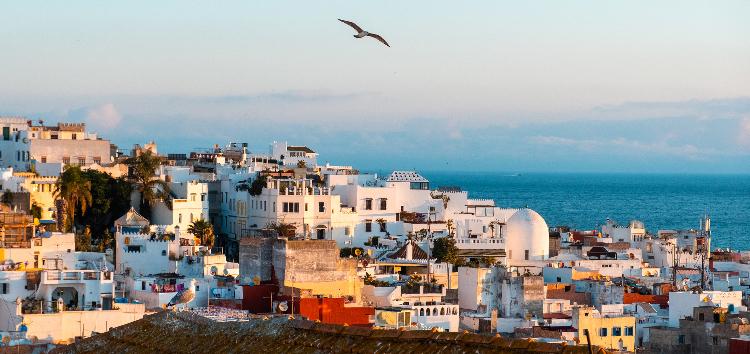- More than €2 billion invested in 42 projects across the southern and eastern Mediterranean region last year
- Ninety-three per cent of the Bank’s investments were in the private sector, while 45 per cent of projects were gender inclusive
- Region continues to benefit from strong donor support
Continuing its support for the southern and eastern Mediterranean (SEMED) region in 2023, the European Bank for Reconstruction and Development (EBRD) made over €2 billion of new investments there, of which 93 per cent were in the private sector. The financing was channelled through 42 projects and multiple trade facilitation lines, and 45 per cent of the projects were gender inclusive.
In Egypt the Bank made new commitments of €1.3 billion in 16 projects, of which 96 per cent were in the private sector and around two-thirds focused on gender and economic inclusion.
Under Egypt’s country platform for the Nexus of Water, Food and Energy (NWFE), the Bank continued to support Egypt’s green transition by issuing a senior secured loan of up to US$ 100 million to Red Sea Wind Energy, which consists of up to US$ 50 million from the EBRD and up to US$ 50 million from the Green Climate Fund (GCF) in favour of Red Sea Wind Energy. The loan will fund the development, construction and operation of a new 500 MW onshore wind farm located in the Gulf of Suez area. Another key private sector investment in Egypt was the Bank’s US$ 125 million contribution to a US$ 455 million financing package, supported by a consortium of international investors, to develop a second container terminal in Damietta Port in Egypt.
The funds will also help create inclusive jobs by way of a skills development programme for those living and working in the Damietta region. The programme will partner with local vocational schools and focus on women’s participation in the work force.
In Jordan the Bank provided €62 million in 5 projects in 2023, of which 61 per cent was in the private sector and 45 per cent in sustainable infrastructure.
Investments included a financing package that blends an EU grant of €30 million and an EBRD loan of €41.3 million for the construction of the Al Ghabawi septic tank facility. This will improve and increase Jordan’s water and wastewater treatment services for local communities and the Syrian refugees who they host.
To promote green investment in the country, the EBRD issued a US$ 15 million loan to the Housing Bank. The loan was provided through the Green Economy Financing Facility, which is supported by the European Union (EU) and the Green Climate Fund.
In Lebanon, the Bank continued to support imports of critical commodities through the Trade Facilitation Programme. Under the Advice for Small Businesses programme, funded by the EU, the Bank provided more than 110 advisory projects to small businesses and start-ups, bringing the total to more than 330 advisory projects to date.
Keen to improve the legal framework for future small-scale renewable energy projects, the Bank also contributed to the drafting of the Decentralised Renewable Energy (DRE) law that was approved by the Lebanese parliament in December 2023.
In Morocco the EBRD invested €391 million in 15 projects. The share of private sector investment reached a record 93 per cent in 2023, while 47 per cent of projects were gender inclusive.
In the aftermath of the devastating earthquake that hit the country in September 2023, the EBRD announced an initial €250 million relief and livelihoods preservation programme to be rolled out over the next two years. The Bank is seeking to address immediate and longer-term reconstruction needs, while supporting the government’s efforts to accelerate the economic development and integration of the affected region.
Under the Women in Business programme aimed at supporting women entrepreneurs, the EBRD provided a MAD 220 million (€20 million) credit line to BMCI. The investment will focus on digitalisation and will benefit women-led micro, small and medium-sized enterprises (MSMEs) located in the regions affected by the September 2023 earthquake.
Helping to improve drinking water supply in rural areas, the EBRD extended a MAD 130 million (€12 million) loan to the Guelmim-Oued Noun region, one of the most water-stressed regions in Morocco, for the upgrade of four wastewater treatment plants. This is the first EBRD investment in the region under the EBRD Green Cities programme. It was also the Bank’s first loan to a region in Morocco.
In Tunisia, the Bank invested €213 million in eight projects. Almost 80 per cent of investments were in the private sector, and 50 per cent of projects were gender inclusive.
To improve the investor experience and investment ecosystem as a whole, attract foreign direct investment and create jobs, the Bank, together with the Tunisian Investment Authority (TIA), launched a national investment platform – a one-stop shop for investors.
The EBRD also continued to support the economy of the West Bank and Gaza, focusing on the development of small businesses through credit lines and trade facilities intermediated by local banks. From 2017 to 2023, the Bank financed 22 transactions worth €90 million, while 128 small businesses received advisory support.
The Bank also launched the Star Venture programme to help high-potential start-ups improve their business performance, grow and unleash their potential.
The SEMED region as a whole continued to benefit from strong donor support, including from the EU, the EBRD SEMED Multi-Donor Account,* the Green Climate Fund, the Global Concessional Financing Facility and other bilateral and multilateral donors.
*Australia, Finland, France, Germany, Italy, the Netherlands, Norway, Sweden, Spain, Taipei China and the United Kingdom.




